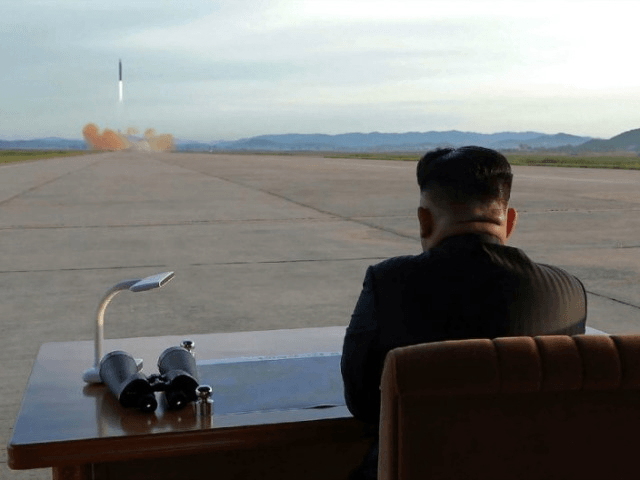Reuters cites a report from Russian media on Tuesday that North Korea has informed Russia its ballistic missiles require only a bit of “modernization” to strike the continental United States.
The Russian report quoted lawmaker Anton Morozov, who said he was told during a visit to Pyongyang last week that North Korea’s ballistic missiles currently have a range of about 3,000 kilometers or a little over 1,800 miles. With “modernization,” the North Koreans believe they can triple that range to 9,000 kilometers or 5,600 miles. The UK Daily Mail notes that would be good enough to hit Seattle or London.
Morozov said there was “no talk about the deadline” for achieving this capability during his visit to North Korea.
“They are preparing for new tests of a long-range missile. They even gave us mathematical calculations that they believe prove that their missile can hit the west coast of the United States,” the Russian lawmaker said in another interview.
“As far as we understand, they intend to launch one more long-range missile in the near future. And in general, their mood is rather belligerent,” he added.
Reuters notes that it could not independently verify Morozov’s information, or confirm which North Korean officials might have spoken to him about their missile program.
South Korea was on high alert for a possible North Korean missile test Tuesday, as it marks the 72nd anniversary of the ruling North Korean Workers’ Party. Ominously, North Korea’s Rodong Sinmun commemorated the anniversary with an editorial urging completion of the “national nuclear force” as quickly as possible.
“We must hold high the banner of the great byungjin policy to accelerate the final victory in the anti-America Armageddon,” the editorial declared, using North Korea’s slogan for developing its nuclear, military, and economic power in concert.
Another possible date is October 18, the beginning of China’s Party Congress—an ideal date if Pyongyang wants to tweak Beijing’s nose, embarrass Chinese President Xi Jinping, and demonstrate its independence from Chinese control. That might seem an unwise course of action for North Korea, but Evelyn Farkas of the Atlantic Council told CNBC on Monday that dictator Kim Jong-un and Xi Jinping have a “lack of respect for one another,” a relationship made worse by China’s decision to support tougher U.N. sanctions against North Korea.
The U.N. Civil Aviation Organization recently warned that North Korean missile tests have become a serious threat to civilian aviation, noting that airliners flying between Japan and Europe have been forced to alter their routes to avoid recent tests. Japan drafted the official condemnation adopted unanimously by the U.N. council on Friday.
Writing in the Observer, Austin Bay proposes that President Trump’s “North Korea Threat Theater” may be working better than his critics would like to admit, a theory that could be put to the test by whatever North Korea does over the next ten days.
In essence, Bay sees a scenario where Trump’s tough stance convinces a critical mass of the North Korean leadership that submission to China (literally over Kim Jong-un’s dead body) is preferable to committing national suicide against a determined United States and its allies. China might actually invade North Korea to make this happen, effectively resolving its security concerns about Pyongyang’s increasingly deranged behavior, its fear of a North Korean refugee tidal wave, and its apprehension about a unified Korean peninsula allied with the United States in a single stroke.
Presumably the Chinese would make enough quiet arrangements with survival-minded North Korean military leaders to make its invasion somewhat theatrical, rather than a bitter fight to the end. At a minimum, paranoid Kim might read the signals Trump is sending to China and his generals, and decide another bloodbath purge of his top officials is needed—a purge that could itself destabilize his regime and/or signal China that it is time to put down their feral attack dog.
Bay’s theory credits Trump with understanding China’s regional goals, and North Korea’s institutional confusion at living in a new world where the Americans do not back down from belligerent threats, well enough to run an effective information warfare campaign against them. New missile tests seem almost required by the Kim regime to demonstrate continued defiance. The key question will be if new tests involve stock missiles fired just to be provocative, or if the missiles contain more advanced technology in line with the drive toward “modernization” Anton Morozov spoke of.

COMMENTS
Please let us know if you're having issues with commenting.